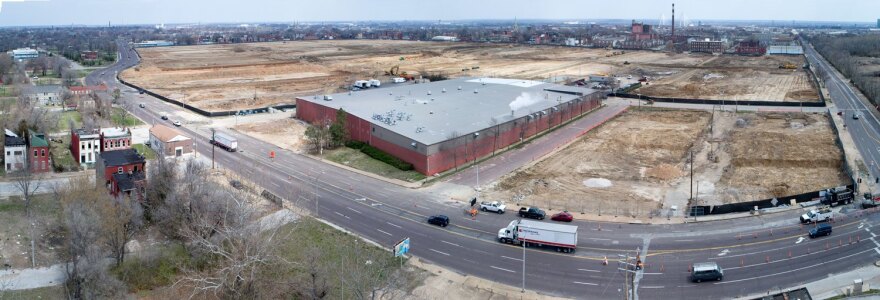Paul McKee’s $8 billion vision for north St. Louis has been controversial since its announcement in 2009, but a new set of legal battles have plagued the project this year.
The future of the entire Northside Regeneration plan was thrown into question in June, when the City of St. Louis accused the developer of failing to complete project work on time. McKee and NorthSide Regeneration argued that they had fulfilled their obligations according to one set of agreements with the St. Louis Development Corporation. The courts will decide which agreements between the city and McKee stand.
In the meantime many north St. Louis residents are left wondering what will become of vacant buildings and properties McKee owns. A St. Louis Public Radio report on the state of 158 buildings McKee promised to rehab prompted lots of questions from our listeners and readers.
Here, we answer some of the most common ones posed with the help of our Curious Louis project.
"Why does the city allow him to have unsecured buildings with unkept yards? Is he being fined?" - Eleanor White, south St. Louis

For years north St. Louis residents complained that McKee did not keep up his properties.
The city claimed in its default letter that McKee didn’t live up to the terms of agreements struck in 2012 and 2014, which included strict building maintenance plans.
But it doesn’t appear that he was fined or otherwise penalized until recently.
McKee told St. Louis Public Radio in August that he hadn’t received citations in volume until after the city said he’d defaulted in June. But the developer was actually exempt from some fines for vacant buildings until this year, after the Board of Aldermen revised a city ordinance.
The city has begun citing McKee for property code violations, and officials say some of those were moved into court after McKee failed to address the problems or pay the fines. The Building Division filed four cases in October and November.
Several years ago McKee hired a property manager, who tracked lawn and building upkeep. But McKee didn’t closely follow the agreements’ instructions for record keeping, so the available information isn’t as thorough or easily available as it should be, according to the development agreements.
That said, over the years he has paid some fees, including reimbursements to city departments that boarded up or demolished properties he owns.
"Is the company receiving any tax benefits? If so, can they be halted?" - Yolandea Wood, Shiloh
Most of McKee’s tax benefits are in legal limbo right now.

Northside Regeneration received a total of $43 million in tax credits from the state of Missouri between 2008 and 2013. In June, shortly after the city declared Northside Regeneration in default, Missouri sued McKee, alleging that he misused the tax credits.
The Missouri Department of Economic Development already rescinded several million dollars in tax credits after awarding them to McKee for the purchase of the Buster Brown Shoe Factory. A lawsuit involving the factory’s purchase value brought some of this to light publicly and spurred city officials to take a closer look at McKee’s work in north St. Louis.
That tax credit program no longer exists, so McKee can’t receive any additional funds through it.
The developer was also eligible for $390 million in tax increment financing, essentially reimbursements for completed work through diverted future tax revenue by the City of St. Louis.
The Board of Aldermen approved the GreenLeaf Market convenience store on N. 13th St. for up to $2.8 million in tax increment financing. The board also approved $6.45 million in tax increment financing for an urgent care center at the old Pruitt-Igoe site.
With the legal status of agreements between McKee and the city in question, it’s not clear whether McKee will be able to access any funds from the city for projects he has completed (a gas station and grocery store), has started (an urgent care center) or proposes in the future.
"Does he have a permit to actually build his urgent care facility?" - Dave Eisenbraun, north St. Louis

Yes, he filed a permit application with the city in February, and it was approved in May.
McKee planned a $72 million complex called HealthWorks Village/Innovation District for the Pruitt-Igoe site. A three-bed urgent care center was supposed to be a small part of the project, which McKee said would include medical buildings, commercial and office space and two hotels.
Construction began on the urgent care this year, but it has not been completed. McKee has not responded to a request for comment on where the project stands.
"How does the McKee development relate to the National Geospatial Intelligence Agency's new facility?" - Jennifer Wright, south St. Louis
The National Geospatial-Intelligence Agency’s $1.75-billion facility is going to be built in the center of McKee’s Northside Regeneration project area.

McKee has claimed that his work was crucial to attracting the NGA facility to north St. Louis, while others say the city could have landed the project without the developer.
Either way, McKee owned about 60 percent of the land in the new headquarters’ footprint. He purchased some of that land directly from the city’s Land Reutilization Authority in a 2012 deal. The city then had to purchase the land back from Northside Regeneration before being able to transfer the full 97 acres to the federal government.
The legal wrangling between the city and McKee raised questions about whether the NGA project could be derailed.
Northside Regeneration’s lender, the Bank of Washington, filed a lawsuit this year arguing that it still had legal claim to the land. The city eventually prevailed and officially transferred the land to the Air Force on Thursday.
Follow Kae on Twitter: @kmaepetrin




